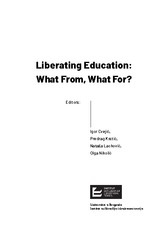Decolonial Emancipation on the Postsocialist Peripheries and the Future of Critical Pedagogy
Аутори
Petkovska, SanjaОстала ауторства
Cvejić, Igor
Krstić, Predrag

Lacković, Nataša
Nikolić, Olga

Поглавље у монографији (Објављена верзија)
Метаподаци
Приказ свих података о документуАпстракт
The main argument of this paper is that a good quality education on the contemporary European peripheries not only should include a progressive, emancipatory dimension on the micro level, but it is highly recommended that it should imply a decolonial dimension on the macro, geopolitical level as well. Therefore, contemporary educational philosophies and policies on the global level should as a matter of principle include a chance for decolonial emancipation. In reality, however, by solely educational means it is hardly possible to guarantee this achievement. To provide pupils and students with a critical understanding of the global market and how to position themselves on it, contemporary progressive education should be designed upon the principles of decolonial emancipation. To explain what decolonial emancipation means and further elaborate on this in the framework of educational science, firstly the replacement of the dominance of the emancipatory approach with the empowerment of a ...decolonial conceptual apparatus in educational discourses on the global level will be examined. Secondly, a revival of emancipatory postulates paralleled with the attempt to connect the disciplinary efforts of postcolonial and postsocialist scholarships, better known as the decolonial option, will be elaborated, including the examples of both theoretical and methodological application in contemporary educational research and policies.
Кључне речи:
emancipation / educational science / progressiveness / decolonization / postsocialist context / postcolonial studies / critical pedagogyИзвор:
Liberating Education: What From, What For?, 2021Издавач:
- Beograd : Institut za filozofiju i društvenu teoriju
Финансирање / пројекти:
- Министарство науке, технолошког развоја и иновација Републике Србије, институционално финансирање - 200025 (Универзитет у Београду, Институт за филозофију и друштвену теорију) (RS-MESTD-inst-2020-200025)
Колекције
Институција/група
IFDTTY - CHAP AU - Petkovska, Sanja PY - 2021 UR - http://rifdt.instifdt.bg.ac.rs/123456789/2519 AB - The main argument of this paper is that a good quality education on the contemporary European peripheries not only should include a progressive, emancipatory dimension on the micro level, but it is highly recommended that it should imply a decolonial dimension on the macro, geopolitical level as well. Therefore, contemporary educational philosophies and policies on the global level should as a matter of principle include a chance for decolonial emancipation. In reality, however, by solely educational means it is hardly possible to guarantee this achievement. To provide pupils and students with a critical understanding of the global market and how to position themselves on it, contemporary progressive education should be designed upon the principles of decolonial emancipation. To explain what decolonial emancipation means and further elaborate on this in the framework of educational science, firstly the replacement of the dominance of the emancipatory approach with the empowerment of a decolonial conceptual apparatus in educational discourses on the global level will be examined. Secondly, a revival of emancipatory postulates paralleled with the attempt to connect the disciplinary efforts of postcolonial and postsocialist scholarships, better known as the decolonial option, will be elaborated, including the examples of both theoretical and methodological application in contemporary educational research and policies. PB - Beograd : Institut za filozofiju i društvenu teoriju T2 - Liberating Education: What From, What For? T1 - Decolonial Emancipation on the Postsocialist Peripheries and the Future of Critical Pedagogy UR - https://hdl.handle.net/21.15107/rcub_rifdt_2519 ER -
@inbook{
author = "Petkovska, Sanja",
year = "2021",
abstract = "The main argument of this paper is that a good quality education on the contemporary European peripheries not only should include a progressive, emancipatory dimension on the micro level, but it is highly recommended that it should imply a decolonial dimension on the macro, geopolitical level as well. Therefore, contemporary educational philosophies and policies on the global level should as a matter of principle include a chance for decolonial emancipation. In reality, however, by solely educational means it is hardly possible to guarantee this achievement. To provide pupils and students with a critical understanding of the global market and how to position themselves on it, contemporary progressive education should be designed upon the principles of decolonial emancipation. To explain what decolonial emancipation means and further elaborate on this in the framework of educational science, firstly the replacement of the dominance of the emancipatory approach with the empowerment of a decolonial conceptual apparatus in educational discourses on the global level will be examined. Secondly, a revival of emancipatory postulates paralleled with the attempt to connect the disciplinary efforts of postcolonial and postsocialist scholarships, better known as the decolonial option, will be elaborated, including the examples of both theoretical and methodological application in contemporary educational research and policies.",
publisher = "Beograd : Institut za filozofiju i društvenu teoriju",
journal = "Liberating Education: What From, What For?",
booktitle = "Decolonial Emancipation on the Postsocialist Peripheries and the Future of Critical Pedagogy",
url = "https://hdl.handle.net/21.15107/rcub_rifdt_2519"
}
Petkovska, S.. (2021). Decolonial Emancipation on the Postsocialist Peripheries and the Future of Critical Pedagogy. in Liberating Education: What From, What For? Beograd : Institut za filozofiju i društvenu teoriju.. https://hdl.handle.net/21.15107/rcub_rifdt_2519
Petkovska S. Decolonial Emancipation on the Postsocialist Peripheries and the Future of Critical Pedagogy. in Liberating Education: What From, What For?. 2021;. https://hdl.handle.net/21.15107/rcub_rifdt_2519 .
Petkovska, Sanja, "Decolonial Emancipation on the Postsocialist Peripheries and the Future of Critical Pedagogy" in Liberating Education: What From, What For? (2021), https://hdl.handle.net/21.15107/rcub_rifdt_2519 .


